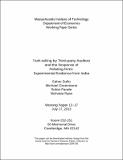| dc.contributor.author | Duflo, Esther | |
| dc.contributor.author | Greenstone, Michael | |
| dc.contributor.author | Pande, Rohini | |
| dc.contributor.author | Ryan, Nicholas | |
| dc.date.accessioned | 2018-05-11T13:40:52Z | |
| dc.date.available | 2018-05-11T13:40:52Z | |
| dc.date.issued | 2013-09 | |
| dc.date.submitted | 2013-07 | |
| dc.identifier.issn | 0033-5533 | |
| dc.identifier.issn | 1531-4650 | |
| dc.identifier.uri | http://hdl.handle.net/1721.1/115307 | |
| dc.description.abstract | In many regulated markets, private, third-party auditors are chosen and paid by the firms that they audit, potentially creating a conflict of interest. This article reports on a two-year field experiment in the Indian state of Gujarat that sought to curb such a conflict by altering the market structure for environmental audits of industrial plants to incentivize accurate reporting. There are three main results. First, the status quo system was largely corrupted, with auditors systematically reporting plant emissions just below the standard, although true emissions were typically higher. Second, the treatment caused auditors to report more truthfully and very significantly lowered the fraction of plants that were falsely reported as compliant with pollution standards. Third, treatment plants, in turn, reduced their pollution emissions. The results suggest reformed incentives for third-party auditors can improve their reporting and make regulation more effective. JEL Codes: Q56, M42, D22. | en_US |
| dc.description.sponsorship | National Science Foundation (U.S.) (Award 1066006) | en_US |
| dc.description.sponsorship | John F. Kennedy School of Government. Sustainability Science Program | en_US |
| dc.description.sponsorship | Harvard University. Harvard Environmental Economics Program | en_US |
| dc.description.sponsorship | Massachusetts Institute of Technology. Center for Energy and Environmental Policy Research | en_US |
| dc.description.sponsorship | International Initiative for Impact Evaluation | en_US |
| dc.description.sponsorship | International Growth Centre | en_US |
| dc.publisher | Oxford University Press | en_US |
| dc.relation.isversionof | http://dx.doi.org/10.1093/QJE/QJT024 | en_US |
| dc.rights | Creative Commons Attribution-Noncommercial-Share Alike | en_US |
| dc.rights.uri | http://creativecommons.org/licenses/by-nc-sa/4.0/ | en_US |
| dc.source | SSRN | en_US |
| dc.title | Truth-telling by Third-party Auditors and the Response of Polluting Firms: Experimental Evidence from India* | en_US |
| dc.type | Article | en_US |
| dc.identifier.citation | Duflo, Esther, et al. “Truth-Telling by Third-Party Auditors and the Response of Polluting Firms: Experimental Evidence from India*.” The Quarterly Journal of Economics, vol. 128, no. 4, Nov. 2013, pp. 1499–545. | en_US |
| dc.contributor.department | Massachusetts Institute of Technology. Department of Economics | en_US |
| dc.contributor.mitauthor | Duflo, Esther | |
| dc.contributor.mitauthor | Greenstone, Michael | |
| dc.relation.journal | The Quarterly Journal of Economics | en_US |
| dc.eprint.version | Author's final manuscript | en_US |
| dc.type.uri | http://purl.org/eprint/type/JournalArticle | en_US |
| eprint.status | http://purl.org/eprint/status/PeerReviewed | en_US |
| dc.date.updated | 2018-02-21T16:30:20Z | |
| dspace.orderedauthors | Duflo, Esther; Greenstone, Michael; Pande, Rohini; Ryan, Nicholas | en_US |
| dspace.embargo.terms | N | en_US |
| dc.identifier.orcid | https://orcid.org/0000-0001-6105-617X | |
| mit.license | OPEN_ACCESS_POLICY | en_US |
